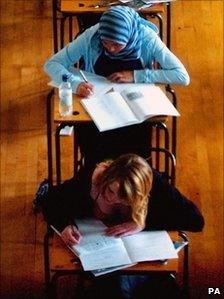Schools in Wales must 'learn from best', says ATL union
- Published

The data showed 19% of schools did worse than predicted and 22% better
A teachers' union says the education system in Wales needs to "up its game", but performance tables "naming and shaming" schools are unhelpful.
Figures showing whether secondary schools have exceeded expectations or performed worse than expected have been obtained by BBC Wales.
Some 19% of schools did worse than predicted and 22% better, based on 2010 GCSE examinations.
The ATL union said schools must "learn from the best" performers.
The Welsh Government data, obtained under a Freedom of Information request, showed 60% of schools performed to the expected level.
The information is one of a number of performance measures used but which have never before made public.
The Welsh Government said it did not believe "simplistic league tables" had a role in improving schools and "that is why we scrapped them".
The ATL union said it would continue to work with the Welsh Government so that "support and encouragement" were given to schools that needed it.
Dr Philip Dixon, director of ATL, said: "We accept that the education system in Wales needs to up its game so that our children achieve the sorts of results that will stand them in good stead for the rest of their lives.
"However, we do not believe that any sort of table that names and shames schools plays any useful purpose in that agenda.
"We need to learn from the best-performing schools how to mainstream their successes, but shaming those that seem to under perform will not be helpful."
The data is considered by experts to be among the most reliable indicators of school performance because it shows the extent to which a school has contributed to a pupil's progress.
The measure, known as value added data, is considered robust because it takes into account factors outside a school's control which are known to affect exam performance, such as poverty levels and pupils' ethnicity, gender and exact age.
But Steve Thomas, chief executive of the Welsh Local Government Association, said it did not properly explain the picture in school across Wales.
He said the tables were statistically insignificant.
"It's like putting down the first piece of a jigsaw puzzle and saying you can now see the full picture," he told BBC Radio Wales.
He said, for example, in February school inspectors described Sandfields Comprehensive in Port Talbot as "excellent and outstanding" and its position on the value added indicator did not reflect the fact that it was an excellent school that performed brilliantly.
Mr Thomas said that if he was a parent in Sandfields he would be confused.
"What you've got here is a very incomplete picture."
David Evans, of NUT Cymru, said: "What we need to be doing is ensuring that there's a good local school for every child and there's a good local school for every community.
"All league tables do, and all comparisons directly from one school to the other, [is] breed resentment within the community, within the schools, and within the teaching profession as well."
The data also reveals which local authorities are considered to be doing well on this measure.
In Flintshire more than half the schools received significantly positive scores, but in Denbighshire, Merthyr Tydfil, Pembrokeshire, Monmouthshire and Ceredigion, not a single school was found to significantly exceed expectations.
Education expert Prof David Reynolds, an adviser to the Welsh Government, said the figures were only one bit of data, but it was "interesting and useful".
"It shows us that we have a very variable education system," he said.
"It's not that we haven't got good schools. We have good schools, and there's good schools here in not particularly wonderfully affluent areas which is a wonderful thing."
The Welsh Government said its policy on not publishing league tables was well known.
"We do not believe that simplistic league tables have a role in the improvement agenda for Wales and that is why we scrapped them," said a spokesperson.
"This is an extremely simplistic league table ranking schools according to a single piece of data from one school year."
- Published20 May 2011
- Published20 May 2011